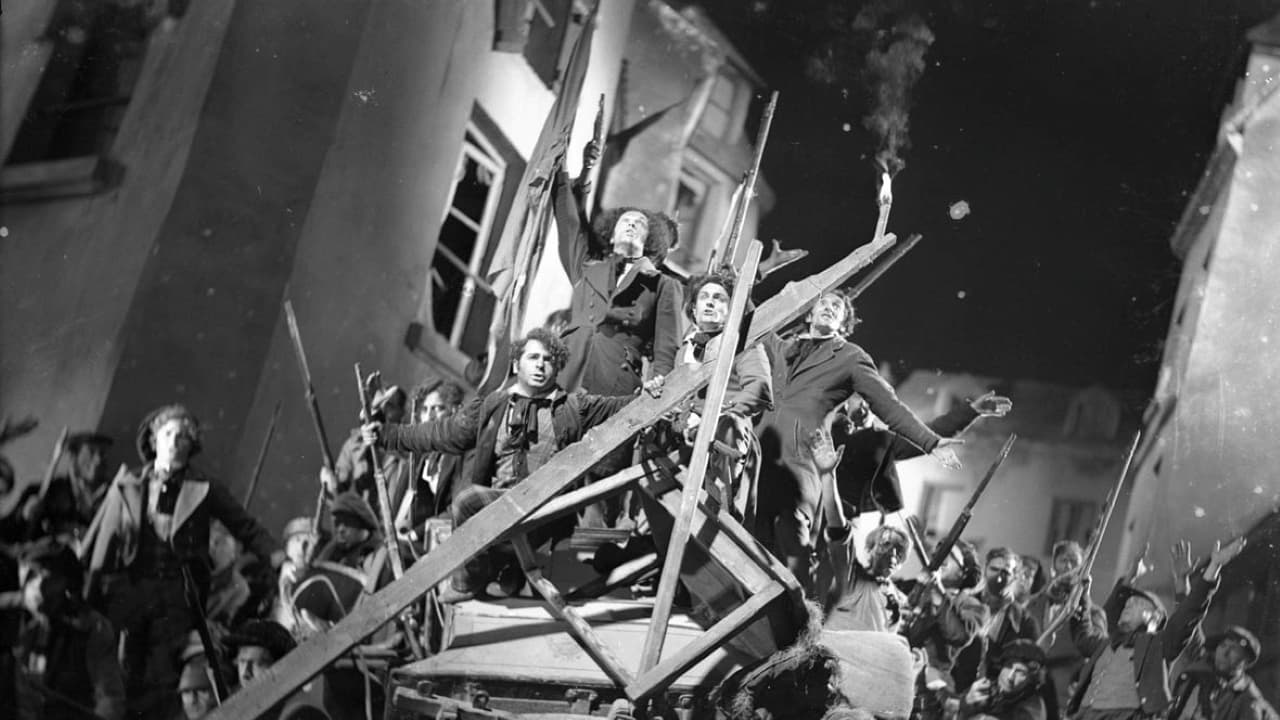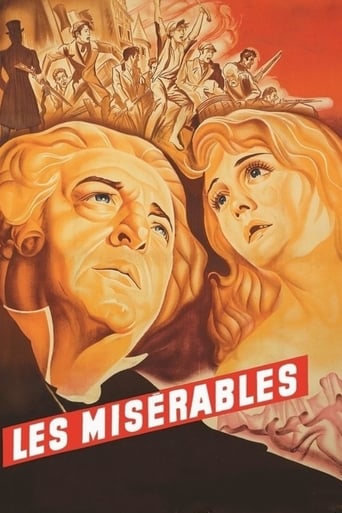

To me, this movie is perfection.
... View MoreMasterful Movie
... View Moredisgusting, overrated, pointless
... View MoreIt's entirely possible that sending the audience out feeling lousy was intentional
... View MoreGenerally considered the best, most complete version of Victor Hugo's novel ever produced, I think I'm finally convinced that I just don't like this story all that much. Oh, don't get me wrong, it has its share of remarkable moments, and, all in all, it's quite a good film. The thing I've noticed with the various adaptations I've seen of it is that I'm with it up until Cosette grows up, then I kind of check out. Almost all the best parts of the story happen in the first half. This version is divided into three feature length films. The first one is by far the best, covering up to the point Fantine dies and Jean Valjean escapes to go rescue Cosette. This hits all the most important themes, particularly the horrible way society treats the destitute. The second section, entitled "The Thenardiers," after the innkeepers who have enslaved Cosette, is great at the start. Charles Dullin is amazing as Thenardier, and Gaby Triquet is so damned adorable as the child Cosette. Cosette as a teenager is fairly uninteresting, and her love interest, Marius, is a completely dull character. The third part covers the revolution portion of the novel, and, frankly, outside of Gavroche (wonderfully played by Emile Genevois), I just don't care about any of it. Jean Valjean is almost superfluous until the final act (the finale here is definitely quite moving). Harry Baur is an amazing Jean Valjean (he also plays Champmathieu, the man wrongly accused of being Valjean in the first part). Charles Vanel is fine as Javert, but the character is kind of dull in this version. Bernard's direction is frequently outstanding and the cinematography is excellent.
... View MoreDon't let the long length deter you, the story is such a big one that is very rich in detail and does need over 2 hours at least to tell it. This film is not just very faithful to it, the most faithful out of all the adaptations, but tells it absolutely thrillingly and with great emotion too. You are drawn into Hugo's world and in the time of the Revolution and along with the 1978 adaptation this is the version with the best characterisation(Valjean has never been this well-realised on film). While Javert is not as prominent as other adaptations his scenes do have tension and there is the feeling of he and Valjean being polar opposites as well as mirror images of one another, the sewer chase is thrilling, Valjean and Cosette's father-daughter relationship has never been more charming, the Revolution scenes have a real emotional intensity and immediacy that has been unparalleled on film and the romance is not shallow nor does it feature too much. In fact all the character relationships are explored beautifully and don't out-balance one another, one will argue that the rest of the characters pale next to Valjean here, I don't agree I think they are all convincing and it's mainly because Harry Baur's performance is so good that there may be that feeling. But it's not just how well it scores adaptation-wise that makes Les Miserables(1934) the best version of the book and one of the best of its decade but how it works so well as a film. There are more lavish and authentic adaptations of the book(1935, 1998) but that says very little because the costumes and sets are still beautifully rendered here and the Expressionistic style the photography and lighting adopt are equally striking. Arthur Honnegar's music score adds much to the atmosphere too, it is sweeping and grand yet emotional and subtly haunting too. The film is brilliantly written and treats the story and Hugo's prose like it knows that it's a classic(and Les Miserables is). The story doesn't run out of steam, allows time for things to develop and never feels too rushed or too structurally thin. And as said early on in the review what is so powerful in the book is translated every bit as powerfully here, and you can tell that everybody connected with their roles and what they're going through, kind of like it's affecting them in a personal way. Of the performances, the best by far is Harry Baur, that he is the only actor as Valjean to properly fit the role physically(Gerard Depardieu in the 2000 mini-series comes close but not close enough) is one part of the allure but every better is that he gives a towering and in this viewer's mind definitive performance in the role, noble, emotive, tragic, charismatic, initially immoral and later redemptive. Charles Vanel is a very icy and ruthless Javert, one person you wouldn't want to cross paths with and there is a tense dynamic between the two and that Javert is very strongly principled. The only thing that has been done slightly better in other adaptations is Javert having a more vulnerable side. All the performances are fine, Fantine is deeply affecting and Cosette and Marius are the least bland their characters have often been since, the only reservation is Eponine being too old(and we're not talking a bit here) but she still is written and portrayed very convincingly so it isn't too much of a hindrance. And of course Raymond Bernard's direction is superb. Overall, a magnificent film, both as an adaptation- the best film adaptation of Les Miserables by a mile- and as a film in general. 10/10 Bethany Cox
... View MoreThis film is available from Criterion. It shows up on eBay with some regularity. Expect to pay $25 plus postage. Raymond Bernard's films have been released in four sets. Les Miserables is contained on a 3-disk set. It is number 4 in the Bernard series. I have just bought one at auction. There remain 3 other listings as of this date, January 4, 2009. The original Pal Secam films with Baur are harder to find, such as the "Rasputine." I am considering buying the region-free, Pal Secam converter, which can be found for under $300, and with which the old VHS PAL Secam tape can be burned to any DVD, and can play on any television. Hope this helps.
... View MoreI am a huge fan of those lavish Hollywood productions of the same period and genre and its strict codes of plot, camera angles and montage, where even the poor have to look glamorous. The Hunchback of Notre Dame (1939), Marie Antoinette (1938), A Tale of Two Cities (1935) and 20th Century Pictures' own version of Les Misérables (1935) come to mind. But this is something different. Starting with the fantastic soundtrack by Arthur Honneger and the expressionist camera and lighting, you enter another world. Of course it helps the authenticity by being a French film with French actors. Here you can see the real French working classes, the homeless and the criminals. By the way, the English subtitles of the Eclipse DVD are good and idiomatic. Also, this monumental and epic film (DVD version 281 min, and a 315 min version seems to exist) has none of the poor production values one is accustomed to with such films from Europe of the 30s. It makes you wonder what might have been possible at, say, MGM if Stroheim or Welles had been given free reign. Let's be glad to have both visions as created in very different studios on both sides of the Atlantic.
... View More